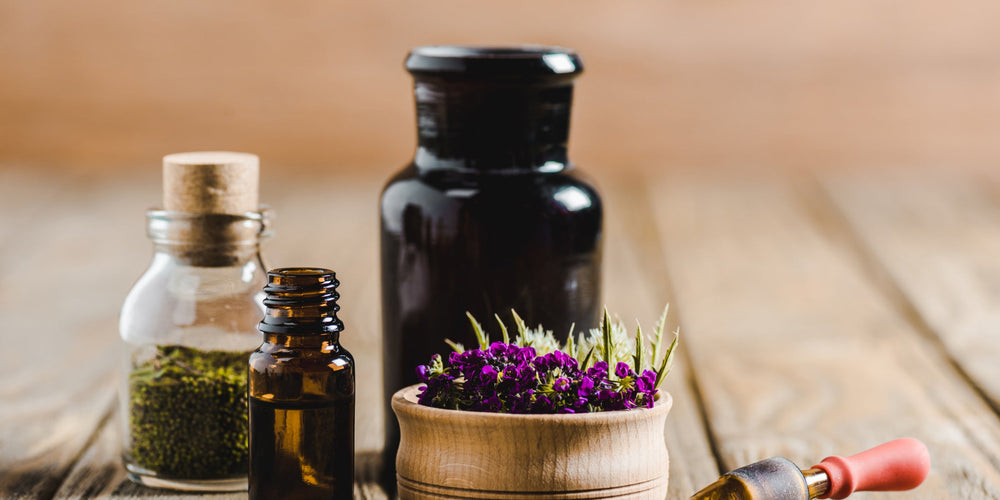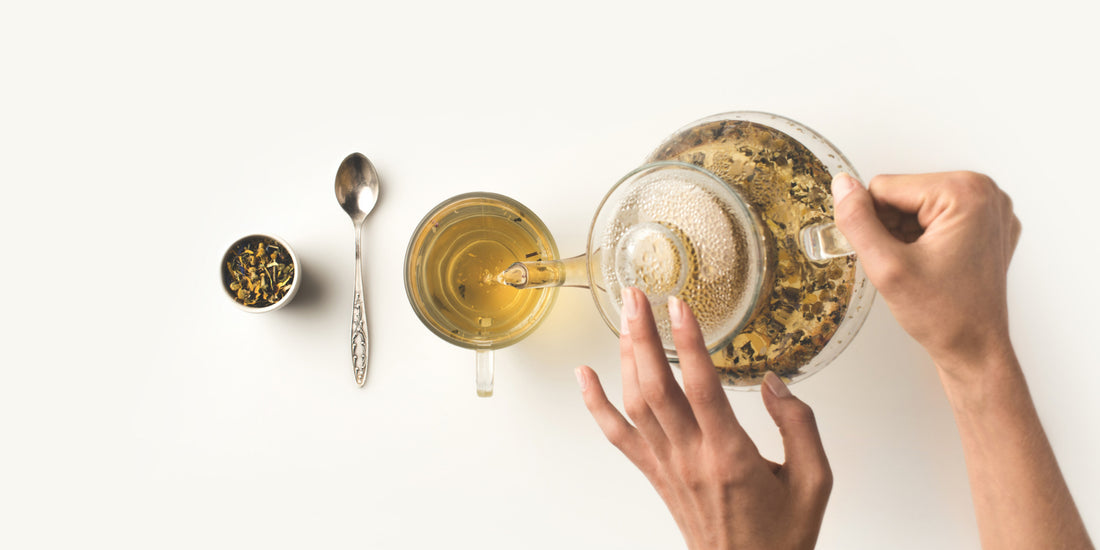The Healing Power of Herbs: How Nature Can Heal Your Body and Soul

Stay tuned to our latest news
Herbs have been used for centuries as natural remedies for various ailments, from minor infections to chronic diseases. They are not only rich in nutrients and antioxidants, but also contain bioactive compounds that can modulate the immune system, reduce inflammation, fight bacteria and viruses, and enhance mood and cognition.
In this article, we will explore some of the most popular and effective healing herbs, how to use them, and what benefits they can offer for your physical and mental well-being. Whether you are looking for a simple tea, a soothing salve, or a potent tincture, you will find a herb that suits your needs and preferences.
The Connection Between Nature and Healing

There is a powerful connection between nature and healing that has been recognized for centuries. Throughout history, people have turned to the natural world for its ability to soothe and restore the body, mind, and spirit. Whether it is the calming effect of a peaceful forest, the rejuvenating power of a mountain hike, or the healing properties of natural remedies, nature has long been seen as a source of healing and renewal.
Studies have shown that spending time in nature can have a positive impact on both physical and mental health. For example, research has demonstrated that being in natural environments can reduce stress, lower blood pressure, and improve mood. In addition, exposure to green spaces has been linked to better cognitive function and a reduced risk of developing mental health issues.
One of the reasons for nature's healing power is its ability to provide a sense of calm and relaxation. The sights, sounds, and smells of the natural world can help to quiet the mind and reduce feelings of anxiety and tension. In addition, spending time in nature can encourage physical activity, which is essential for maintaining overall health and well-being.
Another way in which nature promotes healing is through its ability to foster a sense of connection and mindfulness. Being surrounded by the beauty and diversity of the natural world can encourage a feeling of interconnectedness and gratitude, leading to a greater sense of purpose and meaning in life. This sense of mindfulness and interconnectedness can also promote a greater awareness of one's own body and its needs, leading to a more holistic approach to healing and wellness.
Furthermore, many natural elements have been used for their healing properties for centuries. Plants, herbs, and other natural substances have been used in traditional medicine systems around the world to treat a wide range of health conditions. Today, many modern medicines are still derived from natural sources, highlighting the potential of the natural world to provide healing and relief from illness.
The Power of Herbs in Healing

Herbs have been used for centuries as a form of healing and medicine. Their powerful properties have been known to alleviate symptoms and promote overall well-being in the body. From soothing teas to healing balms, herbs have the ability to aid in the healing process and provide a natural alternative to conventional medicine.
One of the most remarkable aspects of herbs is their ability to work in harmony with the body’s natural processes. Unlike synthetic medications, which often come with a long list of potential side effects, herbs work with the body to promote natural healing and balance.
For example, ginger has been used for its anti-inflammatory properties and ability to soothe digestive issues. Turmeric is another herb that has gained popularity for its powerful anti-inflammatory and antioxidant properties. These natural remedies have the ability to provide relief from ailments without the harmful side effects associated with many pharmaceutical drugs.
In addition to their physical healing properties, herbs also have the power to support mental and emotional well-being. Lavender, for instance, is known for its calming and relaxing effects, making it a popular choice for reducing stress and anxiety. St. John’s Wort is another herb that has been used to support mood and emotional balance.
How Herbs Can Promote Overall Well-Being

Herbs have been used for centuries as natural remedies for a variety of ailments, but they can also be beneficial for promoting overall well-being. Whether used in cooking, teas, or essential oils, herbs can provide a range of health benefits that support physical, mental, and emotional wellness.
One of the key ways that herbs can promote overall well-being is through their ability to support the immune system. Many herbs, such as echinacea, garlic, and ginger, have immune-boosting properties that can help the body fight off illness and maintain optimal health. In addition, herbs like holy basil and ashwagandha have adaptogenic properties, which means they can help the body adapt to and cope with stress, ultimately supporting overall immune function.
Herbs can also support digestive health, which is crucial for overall well-being. Some herbs, such as peppermint and ginger, can help alleviate digestive issues like bloating, gas, and indigestion, while others, like fennel and chamomile, can promote healthy digestion and reduce inflammation in the gut.
In addition to physical health benefits, herbs can also have a positive impact on mental and emotional well-being. Certain herbs, such as lemon balm and lavender, are known for their calming and stress-relieving properties, which can help reduce anxiety and promote a sense of peace and relaxation. Other herbs, such as ginseng and rhodiola, can improve mental clarity and focus, ultimately supporting cognitive function and emotional balance.
Exploring the Differences Between Traditional and Modern Approaches to Healing

Healing is an ancient practice that has evolved over the centuries, with traditional and modern approaches coexisting in today's world. Traditional healing methods, rooted in cultural and historical practices, rely on natural remedies and holistic approaches to treat ailments and promote overall well-being. These methods often draw on ancient wisdom and spiritual beliefs, using herbs, plants, and rituals to address physical, mental, and emotional health.
In contrast, modern approaches to healing are heavily influenced by scientific research and technological advancements. These methods often prioritize pharmaceuticals, surgeries, and cutting-edge medical procedures to diagnose and treat illnesses. While traditional healing focuses on the interconnectedness of the mind, body, and spirit, modern approaches tend to isolate and target specific symptoms and diseases.
One of the key differences between traditional and modern healing lies in their understanding of the root causes of illness. Traditional healers often believe that diseases stem from imbalances in the body, mind, or spirit, and seek to restore harmony and alignment within the individual. In contrast, modern medicine tends to focus on identifying and eliminating pathogens, genetic predispositions, and environmental factors that contribute to illness.
Furthermore, traditional healing methods place a strong emphasis on preventive care and lifestyle modifications, such as dietary changes, meditation, and spiritual practices, to maintain health and wellness. Modern medicine, on the other hand, tends to prioritize reactive treatments and interventions after symptoms have appeared.
While traditional and modern approaches to healing may appear to be at odds with each other, they can also complement and benefit from each other's strengths. Integrative medicine, which combines the best of traditional and modern practices, has gained popularity in recent years as a way to offer more holistic and personalized care to individuals.
What are Some of the Most Popular and Effective Healing Herbs?

There are hundreds of herbs and spices that have healing properties, but some are more popular and widely used than others. Here are some of the most common healing herbs and spices, how to use them, and what benefits they can offer for your health.
- Basil: This delightfully fragrant herb helps lower blood pressure and contains folate, vitamin C and bone-boosting calcium. You can use fresh or dried basil leaves to flavor soups, salads, pasta, pizza, and pesto sauce. Basil also has antibacterial, antiviral, and anti-inflammatory properties, and can help relieve headaches, sore throat, and cough.
- Chamomile: Chamomile is one of the most popular herbs for calming and relaxing the mind and body. It can help reduce stress, anxiety, insomnia, and depression. Chamomile also has anti-inflammatory, antispasmodic, and antiseptic effects, and can help soothe digestive problems, menstrual cramps, skin irritations, and wounds. You can drink chamomile tea, use chamomile essential oil, or apply chamomile-infused creams and lotions to your skin.
- Echinacea: Echinacea is a powerful immune booster that can help fight off infections and speed up recovery from colds, flu, and other respiratory illnesses. Echinacea also has anti-inflammatory, antioxidant, and antiviral properties, and can help reduce pain, swelling, and inflammation. You can take echinacea as a supplement, tincture, tea, or syrup, or use echinacea cream or ointment to treat skin conditions.
- Garlic: Garlic is a potent herb that can protect your heart, lower your cholesterol and blood pressure, and prevent blood clots. Garlic also has antibacterial, antifungal, and antiviral effects, and can help fight infections, boost your immune system, and prevent cancer. You can eat raw or cooked garlic cloves, take garlic supplements, or use garlic oil or powder to season your food.
- Ginger: Ginger is a warming and stimulating herb that can improve your digestion, relieve nausea, vomiting, and motion sickness, and reduce gas and bloating. Ginger also has anti-inflammatory, antioxidant, and analgesic properties, and can help ease arthritis, muscle pain, headaches, and menstrual cramps. You can drink ginger tea, eat fresh or candied ginger, take ginger capsules, or use ginger oil or powder to spice up your dishes.
- Ginkgo: Ginkgo is an ancient herb that can enhance your brain function, memory, and concentration, and prevent cognitive decline and dementia. Ginkgo also has anti-inflammatory, antioxidant, and vasodilating effects, and can help improve your blood circulation, protect your eyes and ears, and prevent stroke and Alzheimer’s disease. You can take ginkgo as a supplement, extract, tea, or powder, or use ginkgo leaf products to make crafts and decorations.
- Ginseng: Ginseng is a renowned herb that can boost your energy, stamina, and endurance, and reduce fatigue and stress. Ginseng also has adaptogenic, immunomodulatory, and anticancer effects, and can help regulate your blood sugar, cholesterol, and hormones, and improve your sexual performance and fertility. You can take ginseng as a supplement, tea, or tonic, or use ginseng root or powder to cook soups, stews, and desserts.
- Lavender: Lavender is a beautiful and aromatic herb that can promote relaxation, sleep, and mood, and reduce anxiety, depression, and headaches. Lavender also has antiseptic, anti-inflammatory, and antifungal properties, and can help heal burns, cuts, insect bites, and acne. You can use lavender essential oil, flowers, or buds to make aromatherapy, bath products, sachets, and potpourri.
- Turmeric: Turmeric is a bright yellow spice that can fight inflammation, oxidation, and infection, and prevent chronic diseases such as cancer, diabetes, and arthritis. Turmeric also has antioxidant, anti-inflammatory, and antimicrobial properties, and can help heal wounds, ulcers, and skin conditions. You can use turmeric powder, paste, or juice to flavor your food, make golden milk, or apply to your skin.
- St. John’s Wort: St. John’s wort is a cheerful yellow flower that can lift your spirits, improve your mood, and treat depression, anxiety, and seasonal affective disorder. St. John’s wort also has antiviral, antibacterial, and anti-inflammatory properties, and can help heal wounds, burns, bruises, and nerve pain. You can take St. John’s wort as a supplement, tea, oil, or tincture, or use St. John’s wort products to make candles and crafts.
How to Use Healing Herbs Safely and Effectively

Healing herbs can offer many benefits for your health and well-being, but they are not without risks and side effects. Before using any herb, you should consult your doctor, especially if you have a medical condition, are pregnant or breastfeeding, or are taking any medication. Some herbs may interact with your drugs, cause allergic reactions, or worsen your symptoms. You should also follow the dosage and instructions on the label or package of the herb, and start with a small amount to test your tolerance. If you experience any adverse effects, stop using the herb and seek medical attention. You should also buy your herbs from reputable sources, and check the expiration date and quality of the product. Avoid herbs that are moldy, discolored, or have a strange smell or taste. Store your herbs in a cool, dry, and dark place, and keep them away from children and pets.
The RENPHO Calibra 1 Smart Nutrition Scale is a device that can measure the weight and nutritional value of your food, including herbs. It connects to the RENPHO Health app, which has a database of over 320,000 food items, including various herbs and spices. You can use the scale to weigh your herbs, scan the barcode or search the name of the herb on the app, and get detailed information on its calories, macronutrients, micronutrients, and 23 other nutrition facts.
@nickels1260 On a healthy eating journey try this with me #productreview #smartnutritionscale #renpho #healthyjourney2021 ♬ original sound - Nicolette Piaubert
By using the Calibra 1 Smart Nutrition Scale, you can explore herbs in different ways. For example, you can:
- Compare the nutritional profiles of different herbs and choose the ones that suit your dietary needs and preferences.
- Track your daily intake of herbs and other foods, and monitor your progress towards your health goals.
- Experiment with different combinations and proportions of herbs and spices, and create your own recipes and blends.
- Learn more about the health benefits and uses of herbs, and discover new ways to incorporate them into your meals and snacks.
Renpho Health Tips
-

How to Brew Your Way to Better Health with Tea Infusions
January 23, 2024
Read more >
-

Sound Bath Therapy: Harnessing Sound Frequencies for Wellness
February 13, 2024
Read more >
-

Connecting with Nature: Exploring the Healing Power of Outdoor Activities
February 11, 2024
Read more >
-

Holistic Wellness: How to Achieve Balance and Harmony in Your Body, Mind, and Spirit
February 8, 2024
Read more >
-

The Amazing Benefits of Sauna and Steam for Your Body and Mind
December 10, 2023
Read more >




